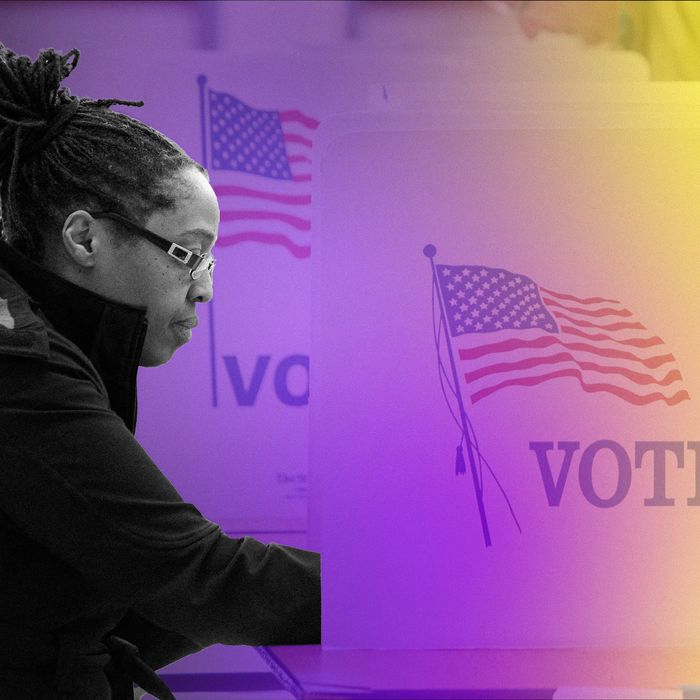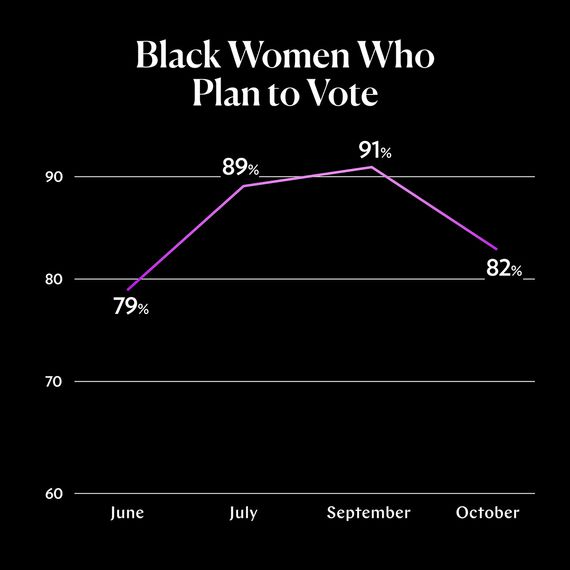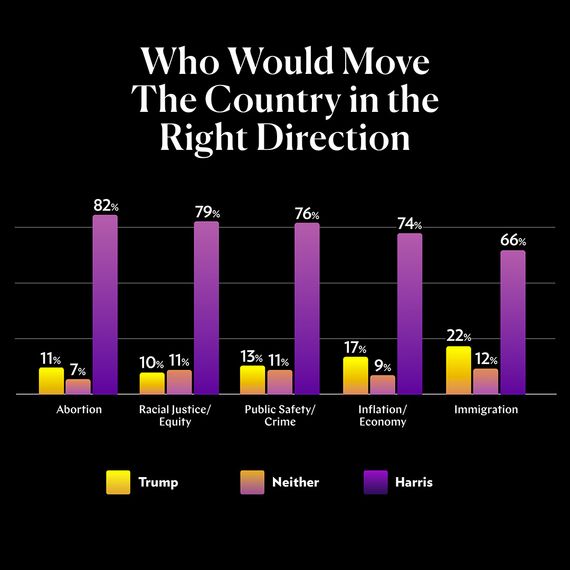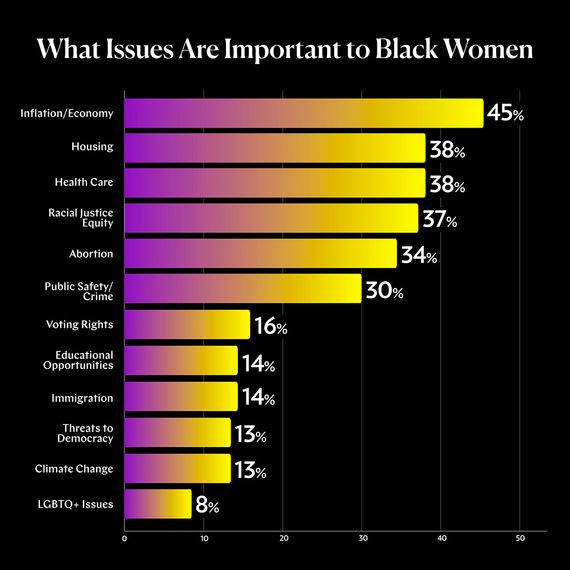
When Kamala Harris kicked off her presidential campaign three months ago, Black women were the first to throw their support behind her. Since then, they’ve helped raise more than $1 billion for the vice-president, gone door-to-door to campaign for her, and packed the stands at her events across the country, leaving little doubt that, as a whole, Harris has their votes. Yet a new survey of 1,200 Black women from the Cut shows that ahead of Election Day, enthusiasm is waning even among this vital voting bloc.
Eighty-two percent of Black women plan to vote in the 2024 presidential election, according to the survey, down from 91 percent in September. By comparison, back in June, when Joe Biden was still running as the Democratic presidential nominee, 79 percent of Black women surveyed by the Cut said they planned to vote in the election. While fewer Black women now plan to vote, the share of respondents who say they would support Harris versus Donald Trump for president remained virtually unchanged at 82 percent and 14 percent, respectively. So this significant drop in the final stretch of the race may reflect voters’ exhaustion after being inundated with texts, calls, emails, and ads begging them to donate to the campaigns and turn out to vote.
Most Black women do have a voting plan in place with 53 percent saying they will vote in person on Election Day, 24 percent voting early in person, and 14 percent planning to mail in their ballots. Eight percent remain undecided about how they will vote. The Cut’s fourth and final survey ahead of Election Day polled Black women ages 18 to 55 between October 7 and October 15.
What’s driving Black women toward Harris and away from Trump
Despite celebrity endorsements causing a stir on social media, the survey found that two-thirds of Black women say support from Oprah and Taylor Swift didn’t impact their decision to support Harris. Neither did endorsements from prominent Republicans like Dick Cheney. However, the deaths of two Black women in Georgia, Amber Thurman and Candi Miller, as a result of the state’s abortion ban did sway 71 percent of Black women to support Harris.
Since September, Trump has repeatedly peddled the lie that Haitian immigrants in Springfield, Ohio, are stealing and eating their neighbors’ pets. This conspiracy theory has hurt Trump among Black women with 55 percent of those surveyed saying they view him more negatively and only 10 percent saying they view him more positively in light of those comments. Trump’s endorsement of self-described “Black Nazi” Mark Robinson in North Carolina’s gubernatorial race has also cost him. Sixty-one percent of Black women say they’re less likely to vote for him given his support for Robinson, who is embroiled in a scandal over disturbing comments he reportedly made on a porn site.
The survey also found that Black women continue to believe Harris will have the most positive impact on their personal finances compared to Trump, 81 percent to 15 percent. Eighty-one percent also feel that Harris would be best at handling the conflicts among Israel and Hamas, Hezbollah, and Iran, compared to just 19 percent who think Trump would be best at handling those conflicts. And in the wake of Hurricanes Helene and Milton, which left devastation across the Southeast, 84 percent say Harris is better suited to manage large-scale natural disasters, compared to 16 percent who say Trump would be best for the task.
How Black women are thinking about immigration and other key issues
Trump’s comments about Haitian immigrants coincided with the former president making a push for immigration to become a central issue in the presidential campaign. He has criticized Harris as a “failed border czar” and has repeatedly referred to “Kamala’s border crisis.” The number of Black women ranking immigration among the three issues most important to them increased significantly between September and October, the survey found, but it still doesn’t crack the top-five issues of greatest importance to these voters. Inflation and the economy, housing, health care, racial justice and equity, and abortion remain the highest-ranking issues of importance to Black women, according to the survey.
Harris’s critics have also accused her of purposely muddying the waters around where she stands on key issues. But the survey found that, compared to September, significantly more Black women say they know where Harris stands on the issues. Overwhelmingly, Black women believe that Harris rather than Trump would move the country in the right direction on immigration (66 percent), inflation and the economy (74 percent), public safety and crime (76 percent), racial justice and equity (79 percent), and abortion (82 percent).
What’s different about Black women who are supporting Trump or less likely to vote
Overall, the survey found 14 percent of Black women would vote for Trump if the election were held today. Black women ages 18 to 44 are more likely to support Trump, and those ages 18 to 34 are also more likely to view him as fit to serve as president. Black women supporting Trump are also more likely to say immigration is one of the most important issues to them.
Trump supporters who believe their vote will have a positive impact on the election increased from 54 percent in September to 65 percent this month, suggesting a rebound in confidence in recent weeks.
While the survey found that 82 percent of Black women approve of how Harris is handling her job as vice-president, those who are less likely to vote have significantly less positive views of Harris’s job performance. They also have lower confidence in political systems and are less likely to be concerned about increases in political violence following the second attempt this year on Trump’s life. And while there was a clear generational split in how Black women say they get their news — those ages 18 to 34 are more likely to go to social-media platforms like YouTube, TikTok, Instagram, and X, while those ages 35 to 55 turn to more traditional sources like broadcast and cable networks, news sites, and local newspapers — those unlikely to vote were more likely to say TikTok is their primary news source.
Regardless of whom they support, Black women feel politicians get a lot wrong about them.
Here, what they had to say:
- “Black women are never protected but the first to be called on when someone needs protection.”
- “Expressing our feelings and/or concerns doesn’t mean we are the angry Black woman.”
- “They feel as though all Black women come from ghetto culture and do not comprehend the political system.”
- “Just because a woman is Black, they assume that most of the Democratic Party is voting for them. The truth is that people are voting for Black women because they are resilient and have what it takes to hold office.”
- “They think we feel oppressed all the time, or want to be treated better than them. But we just want to be treated equally.”
- “Politicians have a habit of labeling Black women as angry and loud, when in reality nobody pays attention to Black women until we’re so fed up that we have to be loud and angry.”
Eighty percent of Black women feel an obligation to their community to vote.
Here, what they said when asked what they would tell people in their lives who aren’t voting:
- “I would seriously explain to my friend that the country is in a crisis and every single vote counts and matters. If you have a problem with what’s going on in the world and don’t vote, then you have no right to complain.”
- “If they know a woman or person of color and if they care about them, they should vote. Donald Trump does not have plans for anybody except rich white straight men.”
- “Our democracy is at stake. This is not the time for inaction. We must act to protect our country from a man who thinks only of himself and those who support him.”
- “Not voting is essentially a vote for Trump, who is unfit mentally and physically to serve the country.”
- “I would say think about the women, or your mom, who don’t have the choice to do what they want with their bodies.”
- “They may not feel like voting, but their employers are. They may not feel like voting, but there are dangerous people who want us to go back to the 1900s. We are not going back.”
Correction: A graphic in a previous version of this story incorrectly visualized who respondents feel would move the country in the right direction on different issues.




